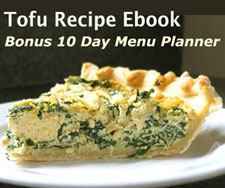
Vegetarian Body Builder Nutrition
Body Builder Needs Vegetarian Protein In Place Of Soy And Wheat
I have chosen to follow a lacto-ovo vegetarian diet. However, there is a problem that I have which causes me serious problems with most vegetarian recipes.
I have both soy and wheat gluten intolerance, and I react strongly to beans with gas and bloating.
I am also a body builder, so I really need a lot more protein than normal folks, and I fear I won't be able to achieve this being soy intolerant.
Are there any vegetarian recipes you can give me, or vegetarian foods I should use as "staples" the way most vegetarians use soy? Are there websites for people with my problem? I have only found a few - usually with 2, or maybe 3 recipes! I really need any help that I can get, please. - S.T.
Savvy Vegetarian Advice
Dear S. T.,
This is a challenge, not a problem. There's a bit of a learning curve - nothing major. You don't need a nutritional science degree, just some reading and practice.
Protein in a vegetarian diet works a bit differently than how we've been conditioned to think about it in our meat centered culture. Everything you eat has protein, even fruit. If you're eating a wide variety of whole foods, and getting enough calories, with a good fat/protein/carb ratio, it's unlikely that you'll have a problem getting enough protein on a vegetarian diet, even being soy intolerant and having a body builder diet.
Many veg athletes depend on soy for protein, as much for convenience as necessity. They consider soy equivalent to meat in protein value, but there are other options.
First, the beans:
Aim to become 'bean tolerant' - beans are concentrated sources of protein, vitamins and minerals. If you've had a chance to read the SV Bean Report, you may have realized that the way they're cooked, prepared and eaten has a lot to do with how well they're tolerated. And the fiber connection.
Build up gradually with beans and lentils, trying different kinds and ways of eating them. Spices make them more digestible - that's also covered in the report. Cooking them yourself helps too, following the bean report suggestions - canned beans are much more gassy, I've found. Sprouting also decreases the gassiness of beans.
If you can't tolerate beans, you may do better with mung dhal, masoor dhal, small green or brown lentils. Different legumes have different nutritional profiles, so do some experimenting.
Other foods can cause gas and bloating - garlic, onions, the cabbage family, dairy - look at what else you're eating too.
Lacto-Ovo Vegetarian:. Consider eating organic eggs from cage free or free range chickens. Low fat cottage or ricotta cheese is also a good source of vegetarian protein - don't go overboard on hard cheese because of the high saturated fat.
Soy Intolerant:
Soy is a common allergen, and should always be eaten with caution. But again, a lot depends on what you're eating, or how much. TVP, or soy isolates found in most processed foods, like veggie burgers, for instance, can cause bad gas, because they're not the whole bean, but the the highly processed remains of soy oil production. See the SV article on TVP.
Tempeh and miso are fermented, which converts some of the gas-causing sugars. Small servings are enough. One pound of tofu is 4 - 8 servings. Cautiously test the boundaries of your soy intolerance. Buy organic and non-gmo.
Nuts, seeds, and grains are all excellent sources of vegetarian protein, in addition to beans. Sprouting seeds increases protein - so sprouted wheat bread or tortillas would be higher in protein. See the article Joy of Sprouting for resources.
Resources:
'The New Becoming Vegetarian', by Melina and Davis- an excellent vegetarian nutrition reference, with a section on vegetarian athletes.
The Myth of Protein Sports nutrition article Bodybuilding article Vegetarian athletesJudith Kingsbury, Savvy Vegetarian






